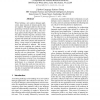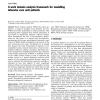117 search results - page 7 / 24 » A Structural Framework for Assembly Modeling and Recognition |
LRE
2006
13 years 7 months ago
2006
When building a new spoken dialogue application, large amounts of domain specific data are required. This paper addresses the issue of generating in-domain training data when litt...
EMNLP
2007
13 years 9 months ago
2007
This paper proposes a framework for semi-supervised structured output learning (SOL), specifically for sequence labeling, based on a hybrid generative and discriminative approach...
CTW
2004
13 years 7 months ago
2004
Abstract Work domain analysis (WDA) has been applied to a range of complex work domains, but few WDAs have been undertaken in medical contexts. One ng effort suggested that clinica...
ACCV
2006
Springer
14 years 1 months ago
2006
Springer
We view the task of change detection as a problem of object recognition from learning. The object is defined in a 3D space where the time is the 3rd dimension. We propose two com...
JCB
2006
13 years 7 months ago
2006
Protein fold recognition is an important step towards understanding protein three-dimensional structures and their functions. A conditional graphical model, i.e., segmentation con...


